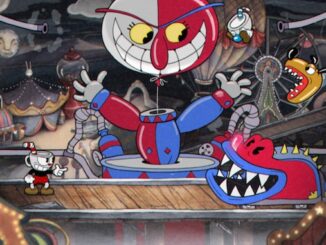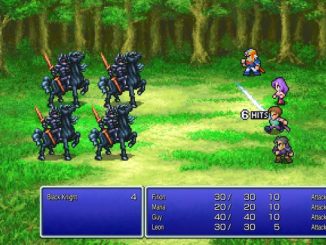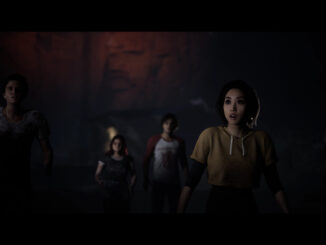Our review of Final Fantasy Tactics: The Ivalice Chronicles, developed by Square. Available now for Switch and Steam/Deck (both reviewed), PS5, PS4, Xbox X/S, and Switch 2.
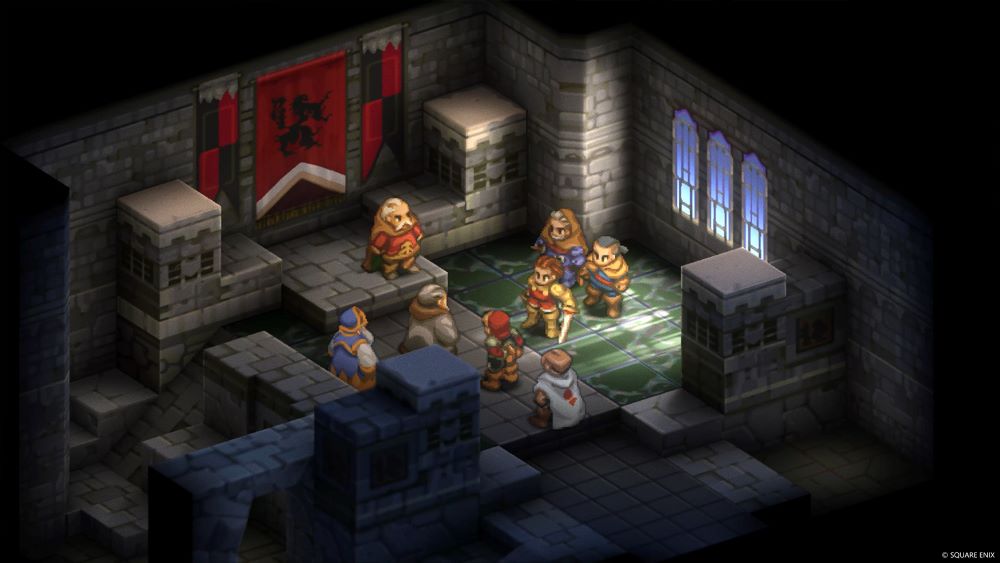
WHAT IS IT?
Fantasy chess. On steroids.
IS IT GOOD?
It’s the essential version of the essential game which brought the Tactical RPG genre to the West. It’s also hopelessly unbalanced, so prepare yourselves.
WHO SHOULD PLAY IT?
Kasparov, Carlsen. HAL-9000.
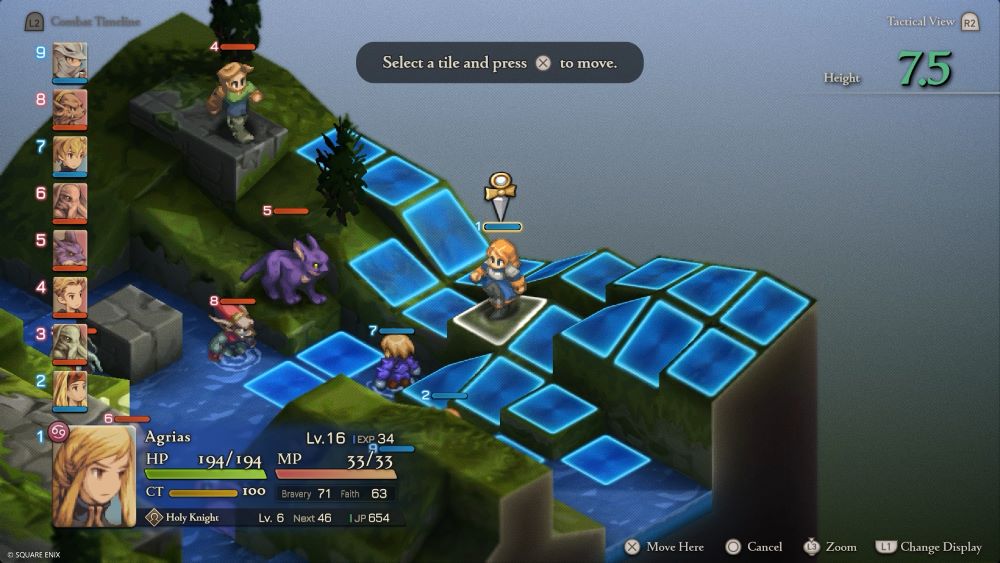
SQUIRE
Many years ago, your resident Toronto Guardian critic wasted away a summer on Nintendo DS puzzle-RPG Might and Magic: Clash of Heroes. Combining RPG gameplay with tile-matching mechanics straight out of Tetris, the (Canadian-made) Clash of Heroes is an underappreciated portable classic, showing what happens when genres are blended by innovative developers.
Though playing in what we’ll call an adjacent space, there’s little doubt Clash of Heroes was heavily inspired by PlayStation classic Final Fantasy Tactics (1997), released by Squaresoft at the height of its creative powers and in the immediate wake of the era-defining Final Fantasy VII. Widely considered one of the great PlayStation titles – and one of the better PlayStation Portable titles when it received a fairly significant rework in 2007’s War of the Lions – Tactics melded real-time-strategy (as in Command and Conquer) with the turn-based RPG stylings which Square is known for.
Now, nearly thirty years later, Tactics has received a top-to-bottom rework, ignoring the War of the Lions version in favour of a modernized Tactics which somewhat reduces the grind and somewhat ups the entertainment value. It looks better, it plays better, and it’s an essential experience for anyone (like me!) who missed Tactics the last couple go-rounds.
It’s still, however, an exasperating grind. Which, for better and for worse, is kind of the point.
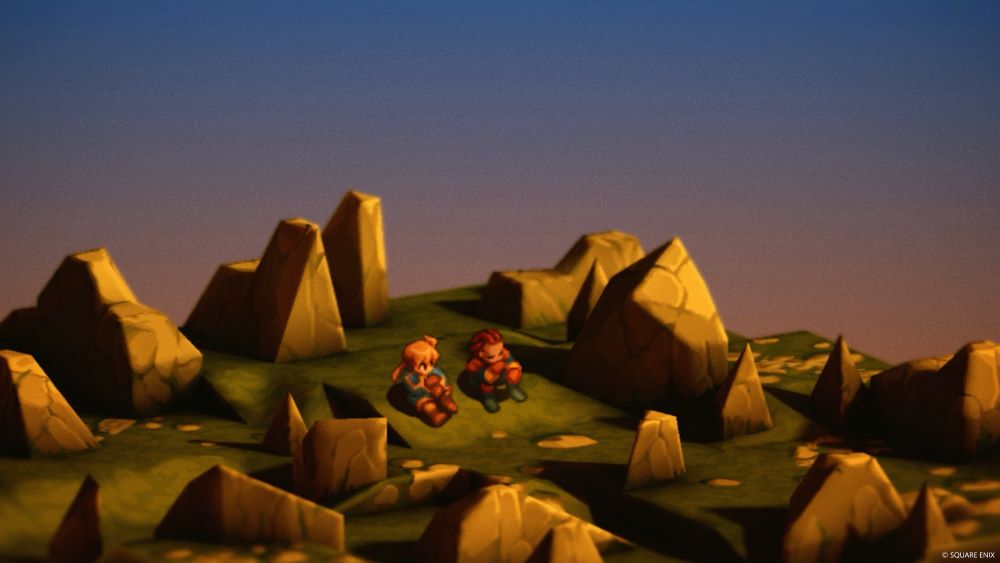
KNIGHT
In ludology (the study of games), chess is what’s known as a “perfect information game”. In chess, as in checkers or Go, all information is openly available to all players at all times, with no secret or random elements to cause surprise. The challenge, then, is strategic: maneuvering your pieces to outflank and outwit your opponent, even as they try the same, based on the same information.
Final Fantasy Tactics is what I’d call a semi-perfect information game. At the metagame level, there’s much to it which is unpredictable: what turns the story will take, what will happen to your ever-growing roster of teammates, what particular challenges await in any given battle. At the granular, battle-stage level, the information nears perfection: you and your computer-controlled foe can see exactly what awaits on the battlefield, what the various units are capable of, where they can move. You can even see turn order, allowing you to predict which foes to prioritize, which can safely be ignored.
The only truly random element of FF Tactics is the under-the-hood die roll that accompanies every attack, and which can occasionally turn a sure-thing attack (90% probability!) into a random fail, costing you valuable time and, more often than not, the life of one of your team members.
I love this aspect of FF Tactics, but I also hate it. Because if there’s one thing about FF Tactics which is also true, it’s that this is a mean bastard of a video game.
Every other mission in FF Tactics is a progression wall. Every other battle comes down to one or two invisible dice rolls, or random errors by computer-controlled enemies or allies, or having the wrong character in the wrong place at the wrong time.
Fans of Tactics will insist that it’s tough but fair, that it can be learned, overcome, manipulated to your advantage. I’m somewhat inclined to agree. But please trust me on this: all those warnings you’ve read about the legendary difficulty of this game are true, even in this ostensibly “player-friendlier” version.
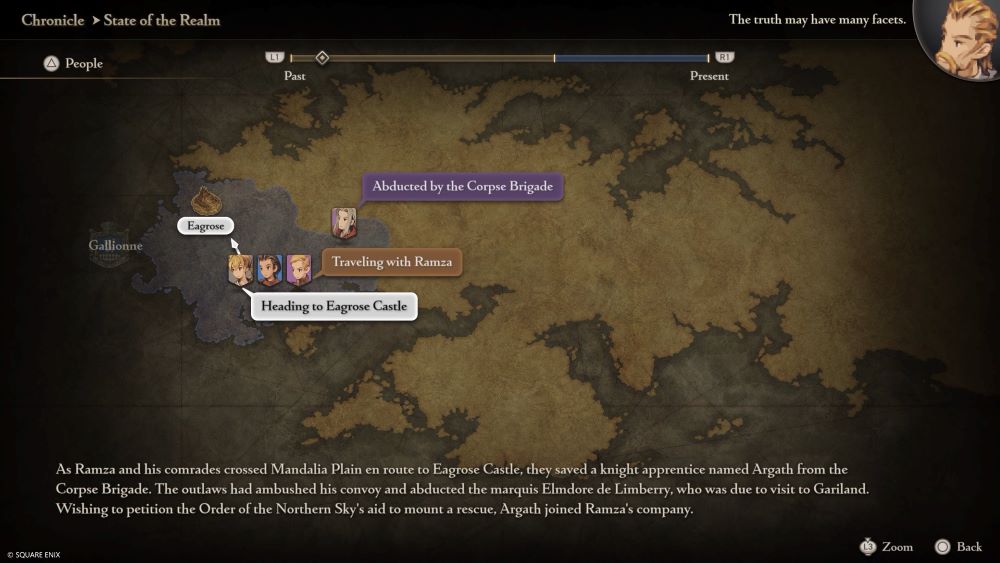
HOLY KNIGHT
The gameplay of FF Tactics is easily the best thing about it.
Each battle takes place in an isometric, diorama-like stage, prepopulated with environmental elements (swamp, rocks, trees, etc.) and broken up into grids consisting of identically-sized squares, one square equalling one movement space, much like a board game. The actions of individual characters – your team consists of an ever-shifting roster of one to five companions – are governed by equipment and attributes in categories such as Defense, Physical Attack, Movement, and Magic. A robust “Job” system lets you freely assign and reassign characters to different classes, accumulating experience and unlocking abilities across traditional RPG classes like White Mage, Thief, Knight, and so on.
The Job class is complex, overwhelmingly so, and your enjoyment of Tactics will partly be informed by your familiarity with this system from the original release, and/or your willingness to pore over online strategy guides. I liked the fact that I could, say, take a fire-wielding Black Mage and teach her the Knight’s “parry” ability, which auto-deflects weapon attacks. I hated the fact this required a nigh-endless grind to unlock the requisite abilities from across classes – and the way the game punished me if I spent too long in one Job, improving its abilities at the expense of others which could only be unlocked through different Jobs.
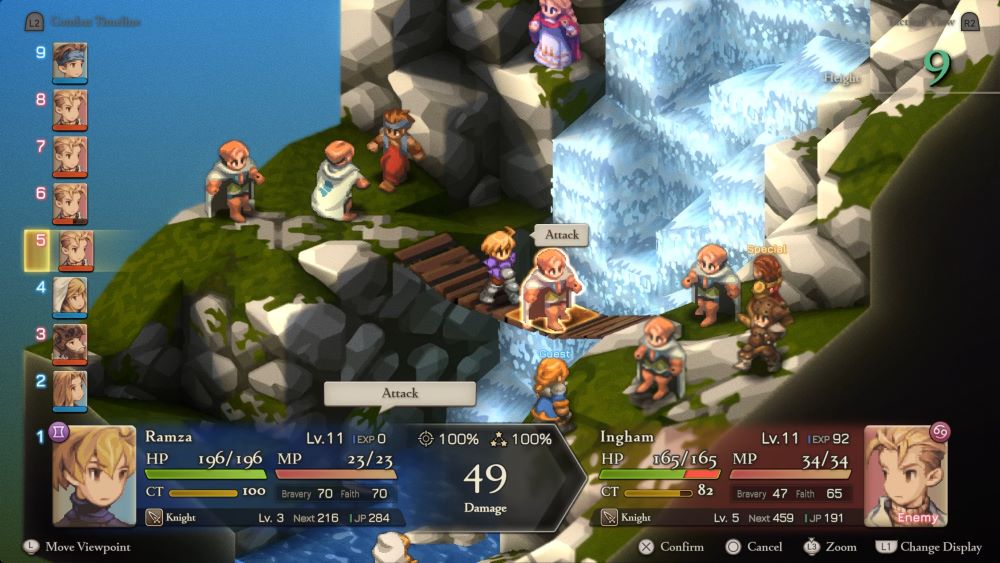
BARD
In fact, this game on the whole is a grind.
Online guides (and my buddy Rob, a Tactics veteran) have all confirmed for me what was already self-evident: unless you’re willing to do really dumb, time-wasting things – like encircle a low-level Chocobo and repeatedly thwack it without killing it, allowing it to heal itself so you can beat it up again – Tactics can be prohibitively difficult.
Maybe I’m older, or maybe I have less free time (or maybe those are the same thing), but my idea of fun isn’t wandering around a map looking for random battles so I can slowly beef up my stats. Sure, Ivalice Chronicles offers a fast-forward function (hold down the right trigger) which partly mitigates this, but at the end of the day, this game doesn’t want you to succeed unless you’re willing to grind and grind again.
Maintaining another ignoble JRPG tradition, Tactics is also wildly imbalanced. This often works in your favour – by combining specific abilities, especially in the latter part of the game, you can easily overwhelm or brute-force your way past foes. But it can also work against you, as in the many confrontations which throw up ludicrous difficulty spikes intended to derail your progress. There’s nothing worse than encountering a particularly resilient foe who’s immune to most attacks, or can heal faster than you can hurt them, forcing you to – you guessed it – go back to the Job grind.
One might think this is all an argument against Tactics, but, as experience shows, this game is largely worth the experience, with rewards for those with the patience and perseverance to forgive its, frankly, bullshit difficulty and grind-heavy mindset.
For one thing, there’s a great story buried in here. Also endlessly complicated, but a great one nevertheless, centred on a brewing civil war in a lovingly realized fantasy kingdom, with a wonderful central hero – Ramza, youngest of the Beoulve family – caught up in political machinations far more complex than he can hope to understand. Following Ramza’s story, along with that of supporting characters like his erstwhile friend Delita and the heroic knight Agrias, is worth it, offering up fascinating twists and turns, with major developments baked right into the dialogue-heavy battle sequences. (The voice acting, in both English and Japanese, is excellent.)
Ivalice is also very portable-friendly. With its short-burst, turn-based gameplay, it’s the type of game which can be easily picked up and played, then suspended at any time without risk of interrupting its natural flow. I tried it on both Steam Deck and Switch, on the go and connected to the TV, and both systems proved perfectly suited for the experience. I honestly can’t imagine being restricted to the TV, as on the original PS1 version, since this game so readily lends itself to travel, long waits in the doctor’s office, and so on.
I still think Final Fantasy Tactics is overhyped, its so-called “classic” JRPG difficulty ruthless in a way that isn’t necessarily fun (don’t even get me started on the whole permadeath thing). And as a veteran of Tactics-like games, including the notoriously difficult XCOM and the rather more reasonable The Banner Saga, I know there’s a way to balance this genre in more reasonable ways. Games like XCOM have demonstrated how to offer challenge without frustration, or, on the flip side, how to hand the player abilities which aren’t so overpowered they break the game. Tactics does not even try to manage that balance, and it shows.
I understand the historical importance of Tactics, and I appreciate the opportunity to play it with modernized controls and extensive quality-of-life improvements – better UI, rebalanced classes, improved camera angles among them – but, all these dozens of hours later, I’m struck by just how badly it wants to grind me down. God knows how those kids survived this back in the ’90s.
***
Final score: 8/10 Chocobo eggs.
Visit the official website for Final Fantasy Tactics: The Ivalice Chronicles here.

